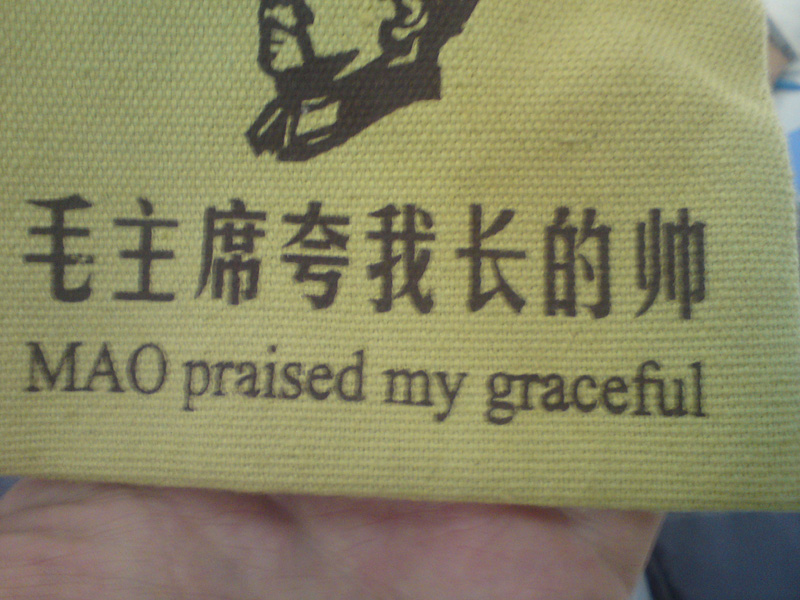MAO praised my graceful
« previous post | next post »
Simon Hunter spotted the following on a student's desk:
Máo zhǔxí kuā wǒ zhǎngde shuài
毛主席夸我长的帅
"Chairman Mao praised me for being handsome."
The author of this breathless sentence was evidently straining to come up with an elegant way to render the colloquial expression shuài 帅, perhaps to make amends for their discourteous reference to Chairman Mao by his surname alone.
Although people write zhǎngde shuài ("looks smart; is handsome", more literally, "has grown up to have a handsome appearance") both ways in characters, technically 长得帅 is grammatically more appropriate than 长的帅, since shuài 帅 ("handsome") is a complement of the verb zhǎng 长 ("to grow up"), and de 得 is the marker of the complement, whereas de 的 indicates the possessive, acts as a relativizer and subordinator, and has other functions as well.
Incidentally, shuài 帅 usually refers to a handsome male but occasionally can be used to describe a female with masculine beauty. For example, you can say a lady in navy uniform looks hěn shuài 很帅 ("smart; sharp"), or it can be used facetiously with reference to a woman.
[Thanks to Rebecca Fu, Zhao Lu, Gianni Wan, and Jing Wen.]

Theodore said,
June 8, 2012 @ 2:39 pm
Any idea why the all-caps on MAO? Is it a cupertino, with the proper name replaced by the initialism for Monoamine Oxidase?
q said,
June 8, 2012 @ 3:14 pm
"Shuai" generally means good-looking, but the connotation is more of the cool, suave type of good-looking, not the stuffy, old-fashioned good-looking that I think when I hear "handsome."
Cool guys that don't look at explosions would be considered "shuai."
hanmeng said,
June 8, 2012 @ 3:19 pm
Was there a time when 的 was permissible in place of this usage of 得? Not to mention in place of the adverbial 地? Or have there always been three of them?
Nik said,
June 8, 2012 @ 3:47 pm
omg, are their words for to grow and the adj long the same word?
Victor Mair said,
June 8, 2012 @ 5:27 pm
@hanmeng
In Modern Standard Mandarin (MSM) the three characters should all be employed for grammatical usages that are separate. All three of these characters indicate particles that did not exist in Classical Chinese, and all three are borrowed only for their sounds, since the characters in Classical Chinese meant something else altogether: 的 ("target"), 地 ("floor"), 得 ("get, obtain").
@Nik
The verb zhang3 and the adjective chang2 are cognates. As you noted, the adj means "long", and you could think of the verb as meaning "to become long" (i.e., "to grow").
languagehat said,
June 9, 2012 @ 7:51 am
perhaps to make amends for their discourteous reference to Chairman Mao by his surname alone.
Wasn't "Máo zhǔxí" the standard respectful way to refer to the Great Helmsman back in the day?
Bob Violence said,
June 9, 2012 @ 8:49 am
I think that was in reference to the English translation, hence "an elegant way to render the colloquial expression shuài 帅" ("graceful" presumably being more elegant than the usual "handsome").
Lugubert said,
June 9, 2012 @ 12:32 pm
@Hat
I suppose the "surname only" refers to not including "Chairman". "Máo zhǔxí" is of course standard.
languagehat said,
June 9, 2012 @ 6:33 pm
Oh, I see, I wasn't noticing that the English only had "Mao." My bad, and thanks!
alec said,
June 10, 2012 @ 11:51 pm
It's actually spitting distance from what would be a passible translation – "MAO praised my (grace|gracefulness)" would convey what the author wanted to convey. (And the East Asian SURNAME capitals serve a useful purpose, albeit one that is a little silly with a famous referent like Chairman Mao.) "Graceful" sounds like a usable if stuffy translation of the phrase glossed as "smart-looking", and I'm not sure what difference if any there is in Chinese as written between a quality as adjective and a quality on its own – "that I am graceful" versus "my grace" (or "gracefulness").
Google Translate, usefully, offers "Chairman Mao boasted my handsome", which really is two steps forward and one step back.
And I don't think there's any getting around how conceptually weird it is. Unless I'm missing an idiom it sounds kind of like saying (in print!) "President Nixon said I was a mensch." Even if it were the right venue for such a callow boast, is the expertise being appealed to really in evidence?
John Swindle said,
June 12, 2012 @ 3:45 pm
Chairman Mao says I'm cool.